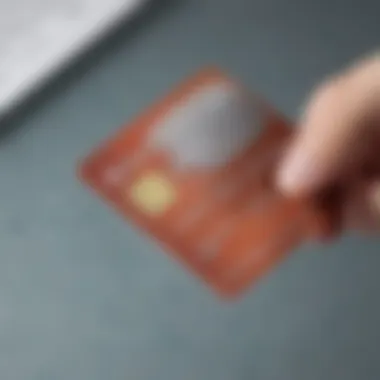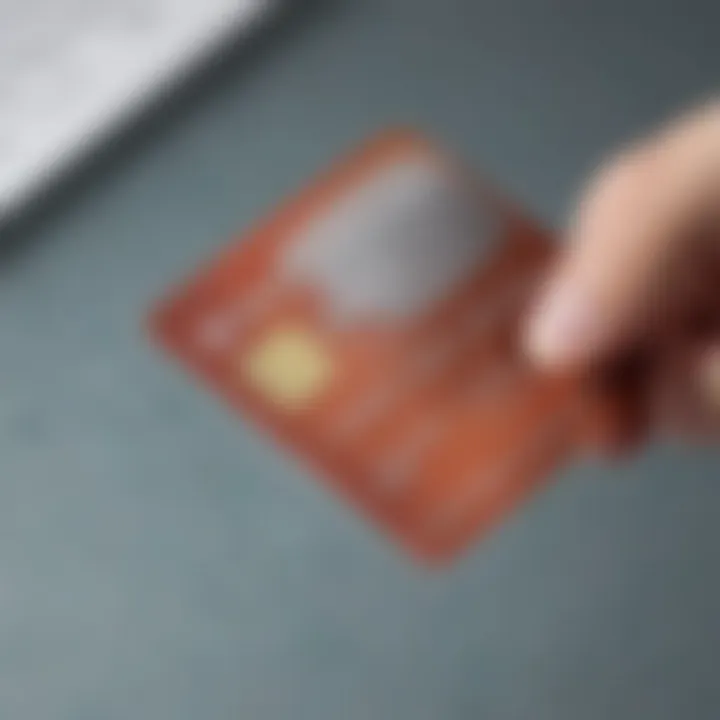Understanding Debit Card Expiry Dates: A Comprehensive Guide


Intro
Navigating the realm of personal finance often involves understanding the finer details that can impact your day-to-day transactions. Among these details, debit card expiry dates might not seem crucial at first glance, yet they hold significant weight for both consumers and financial institutions alike. A debit card's expiry date marks an important milestone in its lifecycle, signaling when the card is no longer valid for transactions. This article digs deep into the nuances of these dates, why they matter, and how you can effectively manage renewals to ensure a seamless banking experience.
As technology advances and digital payments become more ubiquitous, grasping the implications of debit card expiry dates gets even more vital. Not only does it help in avoiding interruption in your financial dealings, but it also enables consumers to assert their rights in the event of issues arising due to expired cards. Today, we'll unpack the layers surrounding these expiry dates, explore best practices for renewal, and shed light on the broader landscape of digital payments that influences how we interact with our money.
As they say, "An ounce of prevention is worth a pound of cure". Understanding the inner workings of debit card expiry will ultimately empower you to navigate the associated challenges and opportunities effectively.
Preamble to Debit Cards
Debit cards have firmly taken their place in modern finance, streamlining the way individuals conduct transactions. Understanding their function and significance is crucial, not only for everyday consumers but also for those in financial sectors. They're often seen as an alternative to cash, providing convenience and security. Moreover, they're readily available, making them an attractive option for many.
Definition of Debit Cards
In straightforward terms, a debit card is a payment card that deducts money directly from a consumer's checking account to pay for a purchase. Unlike credit cards, which allow for borrowing up to a certain limit, debit cards require the user to have sufficient funds available in their account at the time of the transaction. This structure promotes responsible spending, as users can only purchase what they have funds for, thus preventing the accumulation of debt.
Though functionalities may vary, most debit cards come equipped with a Personal Identification Number (PIN) for added security. They also offer similar benefits to credit cards, such as ease of online shopping and the ability to withdraw cash from ATMs. However, each debit card is linked to one account, making it a direct line to a person's finances.
How Debit Cards Work
When a transaction is made, the debit card communicates with the issuing bank through a system of electronic networks. Picture this: the moment you swipe your card at a store checkout, a quick dialogue between the card reader and the bank takes place. This exchange checks if the account has sufficient funds and if the card is valid. If everything lines up, the purchase is approved and the required amount is deducted instantly from the connected bank account.
This immediacy is what differentiates debit from credit transactions; there's no delay or potential for unexpected charges later. It's like paying with cash, just much more convenient. Many consumers favor this method because it helps in maintaining a clear overview of their spending habits.
Overall, understanding debit cards forms the foundation for comprehending aspects like expiry dates and their management. Users who grasp these concepts are better positioned to navigate their financial options effectively.
Understanding Debit Card Expiry Dates
The significance of debit card expiry dates extends beyond mere numbers marked on plastic cards. They encapsulate safety measures, consumer responsibilities, and the dynamic relationship between banks and their clientele. Knowing about these dates is crucial for smooth daily transactions. Without this knowledge, users may find themselves in a pickle when their card refuses to process a payment at an inopportune moment—like right at the register when you're ready to check out.
What is an Expiry Date?
Simply put, an expiry date on a debit card acts as a countdown, signaling the card's validity. It generally appears in the standard format of month and year, often printed on the front side of the card. When that date rolls around, the card essentially becomes useless for transactions. But why do banks enforce these limits?
One primary reason for expiration is security; older cards may have vulnerabilities that can be exploited by fraudsters. Just think of it as changing the lock to your front door every few years. Another aspect relates to ongoing card maintenance costs. Banks want to ensure that they are issuing cards that can support the ever-evolving technology behind secure payments.
It's worthwhile to remember too that expiry dates not only pertain to the card itself but can also affect linked accounts. If a card expires and isn't renewed, funds could become inaccessible, causing unnecessary anxiety.
Location of Expiry Dates on Cards
If you've ever scanned your card and wondered where to find the expiry date, you're not alone. Typically, you can find it just beneath the card number, although designs may vary by issuing bank. It’s usually labelled with “valid throug” or “expires on,” followed by a month and year.
Most users overlook this small but significant detail, treating debit cards more like cash than critical financial tools. Educating oneself on where to locate this information could mean the difference between a successful transaction and an embarrassing refusal at a shop.
Keeping an eye on that date as it approaches can help in planning renewal efforts. It’s one of those details that, when managed well, keeps the moving parts of finance running smoothly.
"Awareness is the first step towards control."
Managing debit card expiry dates exemplifies more than just navigating through your finances; it’s about safeguarding your freedom to transact seamlessly.
The Importance of Debit Card Expiry Dates
The expiry date printed on a debit card doesn’t just hold a place in the design. It plays a crucial role in the realm of financial security and consumer rights. Being aware of the expiry date can be the linchpin for ensuring that transactions are smooth, uninterrupted, and legally compliant. Let’s unpack the significance of these dates in terms of security measures, consumer protection, and banking regulations.
Security Measures
Expiry dates serve as an integral part of the broader security framework for debit cards. This seemingly simple date is in place to minimize fraudulent activities. When a card reaches its expiry date, it is generally deactivated for new transactions if it hasn’t been renewed.


- Protection Against Fraud: Outdated cards can be more susceptible to cloning or unauthorized usage, which is where the expiry date acts as a safety net.
- Systems Update: Regularly expiring cards ensure that banks can routinely update their systems and enhance security features. This avoids any old vulnerabilities from sticking around longer than necessary.
Usually, when a card is about to expire, banks issue a new card equipped with upgraded security features, including improved encryption technology and anti-fraud measures. Such foresight goes a long way in maintaining user trust and battling illicit activities in the financial world.
Consumer Protection
The expiry date also plays into the larger scheme of consumer protection. Knowing when your card is set to expire ensures that you can take preventive actions to maintain access to your funds.
- Timely Notifications: Many banks send out reminders as the expiry date approaches. This is not just a courteous gesture; it serves as a proactive step to ensure you don’t find yourself without a functioning card when you need it the most.
- Renewal Procedures: When a debit card expires, understanding the correct steps for renewal can save consumers from unnecessary inconveniences. This is a critical aspect of consumer education, fostering informed decisions.
Awareness of these details reinforces an individual's right to seamless access to their funds. It empowers consumers, allowing them to exercise their options regarding management.
Banking Regulations
The regulations surrounding the issuance and expiry of debit cards are tightly monitored by various financial oversight organizations. These regulations serve to protect both consumers and financial institutions.
- Compliance with Standards: Banks must adhere to certain international standards which dictate how long a debit card can remain active and the processes for renewal. This helps in maintaining a uniform level of security and consumer protection.
- Transparency in Terms: Regulations also enforce transparency regarding card details. Users should know, clearly, when their cards reach expiry, and what options are available. A well-informed market is crucial for fair practices between banks and consumers.
"Managing your debit card effectively starts with an understanding of expiry dates—knowledge is power in the financial world."
The interplay of these elements demonstrates why staying informed about your debit card expiry date can ultimately safeguard your financial interests.
When Debit Cards Expire
Understanding when debit cards expire is fundamental for financial health and seamless transactions. Keeping track of expiry dates can save users from potential hassles, such as declined transactions or unexpected service interruptions. Most people don’t think about their debit card's expiration until it’s too late, only to find themselves in a bit of a pickle when their card gets denied at a crucial moment.
Timeline for Renewal
The timeline for renewing a debit card generally comes into play a few months before the actual expiry date. Banks usually send a new card well in advance of the expiration, often around 30 to 90 days prior. This window allows cardholders to receive and activate their new debit cards without any immediate pressure.
- Mailing Time: Consider the time taken for mail to arrive. Make sure your address is up-to-date with your bank to avoid hiccups.
- Activation Period: You can typically activate your new card online or through a banking app. Be prompt, as using an expired card can lead to disruptions.
A smooth renewal process keeps your finances running like a well-oiled machine. Many folks overlook this and assume continuity. However, putting attention to these timelines helps in avoiding inconveniences down the line.
Automatic Renewals
Some financial institutions offer an automatic renewal option for debit cards. This means that as long as your account remains in good standing, when your debit card’s expiration date approaches, a new one will be sent out without your active intervention.
- Proactive Management: This approach is particularly helpful for individuals who move often or lose track of things easily. With automatic renewals, there’s one less thing to worry about.
- Possible Fees: Keep an eye out—some institutions might charge fees associated with reissuing cards or have certain stipulations tied to this service.
Many financial institutions also benefit by ensuring customer loyalty, reducing the risk of service interruptions, and enhancing user experience through automatic renewals.
Transaction Implications Post-Expiry
When a debit card reaches its expiry date, it’s not just a simple matter of receiving a new card. Numerous transaction implications arise that users, banks, and merchants must consider. Understanding these implications offers insights into both everyday transactions and the underlying security measures that protect consumers. The significance of this topic cannot be understated; it encapsulates the intersection of consumer rights, financial management, and practical banking operations.
Effect on Payments
The first thing consumers notice post-expiry is the direct effect on payments. Simply put, expired cards cannot process transactions. This means any attempts to use the card for purchases, whether in-store or online, will be declined. Imagine standing at the checkout counter only to find out your card has been rejected. Frustrating, yes, but it serves a vital security purpose.
- Transaction Declines: When trying to execute a payment, the card's expiry date is checked in the backend processing system. If the card has expired, a decline code is generated, alerting the merchant and customer to the need for renewal.
- Impact on Automatic Payments: For those who have set up automatic bill payments, a recently expired card could lead to missed deadlines for bills, potentially resulting in late fees or service disruptions. An easy way to avoid this is to regularly check your card's status and update any automatic billing.
- Consumer Confidence: The ability to smoothly make payments influences consumer confidence in their financial tools. Frequent declined transactions can undermine trust in the reliability of debit cards.
The implications extend beyond just personal inconvenience; they can affect household budgets and financial planning as well, particularly if utility bills or subscriptions are missed due to an expired card.
Handling Denied Transactions


Once your card is expired, learning to handle denied transactions becomes imperative for anyone who wishes to maintain a seamless financial life. This situation could arise unexpectedly, and knowing how to respond can save you a great deal of hassle.
First, when a transaction is declined due to an expired card, it’s critical to understand the root cause. Usually, a message will be displayed at the point of sale or within an online payment portal indicating that the card is no longer valid. This serves as a direct prompt to address the issue.
Steps to Handle Denied Transactions:
- Check the Card Expiry Date: Always verify the expiration date printed on your debit card to confirm if it’s indeed expired.
- Contact Your Bank: If your card is expired, contact your financial institution's customer service. They may provide insights and, in some cases, can expedite a replacement card.
- Use Alternative Payment Methods: Until you have a new card, using another payment method like credit cards or mobile wallets can help ease the transition and maintain financial activities.
- Update Payment Details: For subscriptions, ensure you update payment details with the new debit card information as soon as you receive it to prevent any hiccups in service.
- Maintain Open Communication: Keeping open lines of communication with your service providers can make a huge difference. If you anticipate a payment delay due to your card situation, informing them can mitigate penalties.
Ultimately, how someone manages the challenges posed by expired cards is directly related to their overall financial literacy. Adopting proactive measures and educating oneself on potential pitfalls will facilitate smoother transitions whenever expiry dates occur.
"Awareness is the first step to management. The better you manage your transaction implications, the less stress you'll find in your financial dealings."
In wrapping up, transaction implications post-expiry serve as an important reminder of the dynamics involved in debit card management. Through understanding, consumers can better navigate the intersection of their financial health and their banking products.
Managing Expiry Dates
Managing the expiry dates on your debit card is essential for a seamless financial experience. It's more than just a number printed on the card; it’s a linchpin that affects your transactions, services, and even your financial reputation. Without proper management, you might find yourself in a sticky situation at the most inconvenient time.
Tracking Expiration
One of the first steps in managing your debit card’s expiry date is to actively track when it’s due to expire. Most debit cards are set to expire every three to five years, depending on the bank’s policy. Ignoring the expiry date can lead to unnecessary headaches, particularly if you rely heavily on your card for everyday transactions.
To help with this, make a note in your calendar a few months before the expiration. If your card is set to expire in June, jot down a reminder in March. This proactive approach ensures that you can address the renewal process without any last-minute rush.
Additionally, many banks offer notifications through their apps or via email to alert users of upcoming expirations. However, it’s wise not to solely depend on digital reminders. A physical reminder can often be beneficial, too.
"A wise person once said, ‘An ounce of prevention is worth a pound of cure.’ In this case, tracking expiration is the ounce that can save you a lot of hassle down the road."
Preventing Service Disruption
Keeping an eye on your debit card’s expiry date is crucial to prevent any service disruption. Consider the number of automatic payments linked to your debit card—bills, subscriptions, and other services. If your card expires and you haven’t updated your payment method, you could face late fees or even interruptions in service.
Here are a few simple strategies to guard against unexpected disruptions:
- List of Services: Create a list of all services connected to your card, noting payment dates.
- Notify Providers: If your card is close to expiring, inform your payment providers ahead of time. Many companies will do their best to resolve any issues before they arise.
- Shuffling Payments: If you’ve received your new card, don’t delay in updating your payment information with your service providers right away.
By taking these proactive steps, you grant yourself peace of mind, knowing you won’t be caught off guard without access to critical services. Every small gesture adds up to create a more reliable financial framework.
Reactivating Expired Cards
Reactivating an expired debit card is not just a mundane task of filling out forms—it's a pivot point in maintaining financial agility. Many might overlook the significance this process carries, assuming they'd have to get a new card each time. However, navigating the reactivation landscape effectively can lead not only to saving time but indeed preserving one's financial connection.
As we delve into this, consider that reactivation often serves as a bridge; it reconnects users to their existing accounts and retains favored features. Moreover, there's an undeniable ease in not having to update all billing arrangements every time a card lapses. This convenience is crucial, especially in today's fast-paced world.
Procedures for Reactivation
The procedures for reactivating an expired debit card can vary across institutions, but generally follow a relatively streamlined path. Here’s what you might expect:
- Contact Your Bank: The first step involves getting in touch with your financial institution, either through a phone call, online chat, or in-person visit.
- Verification Steps: Prepare to verify your identity. Institutions often require various forms of identification, like your Social Security Number, account number, or even personal information.
- Submit Request: Once you're verified, you can submit a reactivation request. Some banks allow for this process online, letting you handle it within a secure portal.
- Await Confirmation: After submission, it could take from a few business hours up to a couple of days to confirm your card is reactivated. Keep an eye on notifications from your bank—some may also send texts or emails to let you know.
- Testing the Card: Once confirmation arrives, it is prudent to make a small transaction to ensure everything is working as it should.
Being aware of these steps can save quite a headache in managing finances.
Financial Institution Policies
Each bank operates with its unique set of policies regarding expired cards, and understanding these nuances can be pivotal in making swift decisions. Here are some considerations regarding financial institution policies that impact card reactivation:


- Grace Periods: Some institutions might offer a grace period during which the expired card could still be used until reactivation is finalized. Knowing this can prevent sudden service interruptions in your digital transactions.
- Fees and Charges: It’s imperative to understand if there are any associated fees for reactivation. Some banks may charge fees, while others might be free of charge to maintain customer satisfaction.
- Credit Reporting: If your debit account is tied to any credit reporting, inquire whether an expired card might influence your credit score or overall financial standing in any way.
- Security Protocols: Financial institutions would likely conduct a security review before allowing reactivation, ensuring no suspicious activity has occurred during the card's inactivity.
In short, knowing your bank’s policies equips you to make informed decisions, ensuring that you are not caught off guard when the time comes to reactivate.
Understanding these aspects not only empowers you as a consumer but also instills confidence in navigating the often convoluted corridors of personal finance.
Consumer Rights and Responsibilities
Understanding the landscape of consumer rights and responsibilities in the realm of debit card usage is paramount for every cardholder. This section provides insight into the rights you hold as a consumer, the obligations that accompany these rights, and how both aspects interplay when dealing with debit card expiry dates. A solid grasp of these concepts can empower you to navigate financial transactions more effectively and advocate for your interests when necessary.
Understanding Your Rights
As a debit cardholder, you have a set of rights designed to protect you and your financial assets. Here are significant points to consider:
- Right to Information: You are entitled to clear and concise information regarding your debit card account, including fees related to expired cards, renewal processes, and any alerts on breaches of security. Transparency helps you manage your finances more efficiently.
- Right to Dispute Transactions: If a transaction was processed after your card expired or was compromised, you have the right to dispute these charges. Contact your bank immediately to assert your claim.
- Right to Timely Renewal Notifications: It’s standard practice for banks to notify cardholders well in advance of expiration dates. Expect reminders, ideally at least a month before, to ensure you can prepare for a renewal without service interruption.
"Knowing your rights in financial matters is like having a safety net. It provides reassurance and helps avoid pitfalls."
In addition to these rights, many financial institutions are bound by regulations that enforce these standards, which further safeguard your position. Awareness of these factors encourages proactive financial management.
Obligations as a Cardholder
With rights come corresponding responsibilities that every cardholder must acknowledge:
- Keeping Contact Information Updated: It’s critical to ensure your bank has your latest contact details. Failure to provide updated info can result in missed notifications about your card's expiration or renewal.
- Regular Account Monitoring: Frequently checking your statements and account activities helps catch unauthorized transactions or discrepancies promptly. If you let things slide, you might miss vital details, particularly concerning expired cards.
- Adhering to Bank Policies: Each banking institution has its own policies regarding card renewals, disputes, and expired cards. Familiarize yourself with these guidelines to avoid lapses in service and maintain good standing.
Understanding these rights and obligations not only fortifies your position as a consumer but also encourages responsible use of debit cards. This comprehension forms a crucial groundwork for navigating the intricate tasks related to card expiry dates and renewals.
The Future of Debit Cards and Expiry Dates
The dynamic landscape of finance constantly evolves, and debit cards are no exception. The discussion surrounding the future of debit cards, particularly the significance of expiry dates, offers keen insights into how consumers and financial institutions can navigate an increasingly digital world.
As we move forward, understanding the implications of emerging payment technologies and the rise of digital wallets becomes crucial. Both of these elements not only impact the usability of debit cards but also how expiry dates are perceived and managed.
Emerging Payment Technologies
With the relentless march of technology, various payment solutions are cropping up, changing consumer behaviors. Innovations such as biometric payment systems, contactless payments, and even virtual debit cards are becoming increasingly common. Here are some key trends:
- Biometric Authentication: Consumers are keen on secure ways to verify their identity. Biometric methods—like fingerprint and facial recognition—will soon play a leading role in ensuring that expired cards do not compromise security.
- Tokenization: This process replaces sensitive card information with unique tokens during transactions, minimizing fraud risk. As a result, consumers won�’t have to worry as much about expiries leading to security issues.
- Instant Issuance: Some banks have shifted towards instant card issuance, allowing customers to receive new cards at the moment they request them, nullifying concerns about expiry dates, at least for temporarily expiring cards.
The interaction of these technologies with debit cards will dictate their future function and how expiry dates are handled, leaving consumers with a more seamless and secure payment experience.
Impact of Digital Wallets
In the trenches of tomorrow’s payment methods, digital wallets are emerging as a game changer. With these wallets, which allow users to store debit card information and transactions digitally, the concept of expiry dates is undergoing a transformation. Consider the following:
- Digital Extensions of Cards: When a debit card expires, users can often still access funds through linked digital wallets like PayPal or Apple Pay. This access alleviates the immediate concern of card expiry, as wallet connections can provide continuity.
- Notifications and Alerts: Many digital wallets send automatic reminders about card expiries, allowing users to manage their cards proactively. Unlike traditional banking systems, where a simple expiry might lead to denied transactions, wallets take a more consumer-friendly approach.
- Broader Acceptance: As more retailers embrace digital wallet payments, expiry dates may become less of a hurdle in consumer transactions, but they will still play a vital regulatory and security role in the background.
In summary, as we peer into the future, it becomes increasingly clear that the trajectory of debit cards will hinge upon technological advancements and the rise of digital wallets. These shifts are not just changing how we view expiry dates but also emphasizing the need for effective management in a significantly altered finance environment. The days of simply flipping a card over to check its expiry will soon seem remote in the rearview mirror, as we embrace an intricately connected financial future.
Closure
In synthesizing the various aspects of debit card expiry dates within this article, it becomes evident that understanding the implications of these crucial elements can significantly enhance a consumer's financial management. Recognizing that an expiry date is not merely a number, but a pivotal indicator of card validity, safety and consumer responsibility is vital. Every cardholder must be aware that an expired card can lead to disruptions in daily transactions, potential fees, and could even expose personal information to risks if not managed properly.
Summary of Key Points
- Significance of Expiry Dates: The expiry date serves as a checkpoint, ensuring that consumers maintain an active and secure financial instrument.
- Consumer Rights and Responsibilities: Awareness of consumer rights regarding card management is crucial for navigating any issues related to expired cards.
- Future Trends: The evolution of payment technologies and the rising prominence of digital wallets signal a shift in how we might view debit card management moving forward. Traditional concepts are evolving, needing consumers to adapt.
- Proactive Management: Keeping track of expiry dates helps in preventing service interruptions and maintaining smooth transactions.
"Plan for the expiry like you plan for a rainy day; it might just save you from a storm of inconvenience."
Final Thoughts on Card Management
Understanding that your debit card is an extension of your financial portfolio paves the way for a more secure and reliable usage. Maintaining timely renewals, staying informed of rights, and recognizing the broader impact of payment innovations are strategic steps for anyone looking to ace their financial game.



